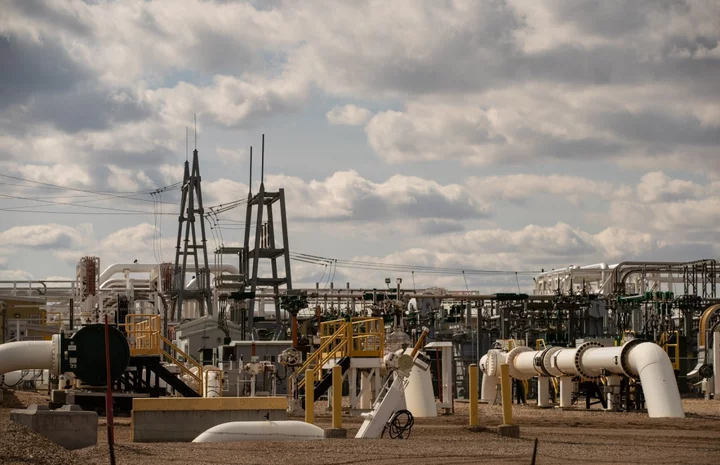Alberta will never comply with a federal plan to phase out carbon emissions from power generation by 2035 and will go its own way if such a plan is implemented, Premier Danielle Smith said.
The province, which relies on fossil fuels for 89% of its electricity, can achieve a net zero power grid by 2050 but the Trudeau government’s 2035 goal would be too costly and carry the risk of blackouts, Smith said at a news conference on Monday. The price tag to zero out emissions could run as high as C$400 million ($297 million), she said.
“We will never allow these regulations to be implemented here, full stop,” she said. “If it comes down to it, we are going to do our own thing. We have to.”
Smith’s United Conservative Party, which was reelected in Canada’s major oil and gas-producing province in May, has taken a confrontational approach to dealing with Justin Trudeau’s Liberal government in Ottawa. Federal plans to phase out emissions from the electricity grid and slash emissions from the oil and gas industry are an unconstitutional encroachment on the rights of provinces, Smith has said, threatening to defy federal legislation if necessary.
Her comments came about two weeks after Smith’s government announced a seven-month pause of wind and solar projects in the province to review the use of agricultural and public lands, reclamation of land and the role of municipal governments in land selection for project development. Smith defended the decision on Monday, saying the province needed to address whether there would be sufficient base-load power supply to prevent power cuts when wind and solar aren’t sufficient.
Canada’s environment minister, Steven Guilbeault, released draft regulations last week to make the country’s electricity systems net zero by 2035. The federal government has pledged C$40 billion in new tax credits and other investments to incentivize provinces and territories to green their power grids. But that will be easier for some than others, and both Alberta and Saskatchewan have balked at the pace of the expected change.
Alberta has moved swiftly since 2015 to phase out coal power by the end of this year, seven years ahead of schedule, and natural gas has largely filled the gap, despite growth in wind and solar power. Its neighboring province Saskatchewan is also mostly powered by fossil fuels and Premier Scott Moe has called the Trudeau government’s plan “impossible.”
The draft regulations would permit some natural gas power generation, but those plants would have to emit the equivalent of 30 metric tons of carbon dioxide per gigawatt-hour or less annually and could use carbon capture and storage systems to meet that standard.
“What we’re talking about is not a fossil fuel-free grid by 2035. It’s a net zero grid by 2035,” Guilbeault said.
But the Canadian Association of Petroleum Producers said the regulations, as drafted, would limit the ability to use natural gas as a backup to renewable energy after 2035.
“Canada produces some of the world’s lowest-emitting natural gas and is a critical part of our country’s energy security, including acting as a backup for the intermittency challenges of renewable power,” said chief executive Lisa Baiton in a statement.

